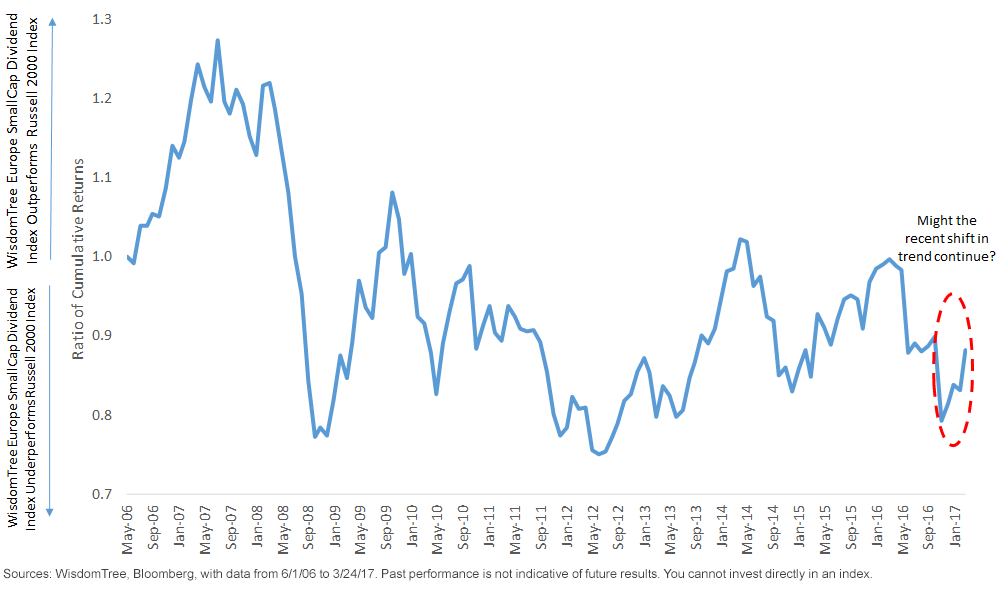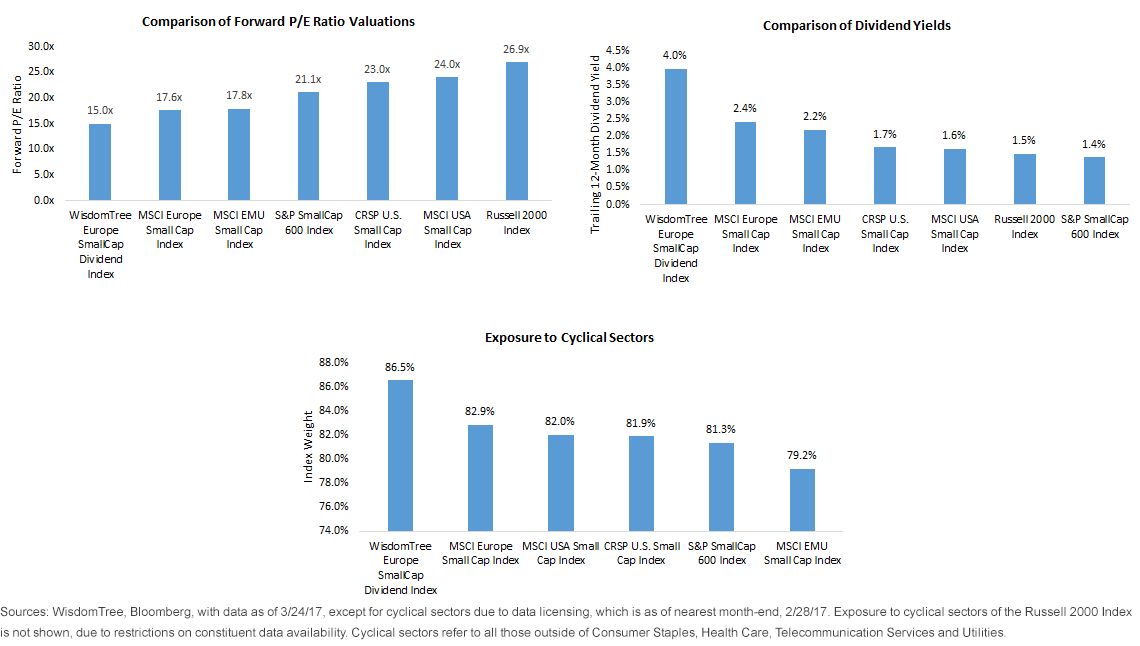How to Counter Pessimism on European Equities


2017 has been a difficult year to find investors willing to allocate exposure to European equities. Yet we find the following:1
- The STOXX Europe 600 Index is up 4.84% in local currency terms, and the euro has appreciated by 2.67% against the U.S. dollar.
- The FTSE 100 Index is up 3.80% in local terms, and the pound has appreciated by 1.08% against the U.S. dollar.
This is at a time when the S&P 500 Index was up 5.20%, and it’s notably a far cry from the truly challenged performance that we saw for the first six months of 2016 in Japan (-19.46%)2 or during the 2015 year in emerging markets (-14.92%).3
The bottom line: While sentiment toward Europe—especially with all of the elections set to occur throughout 2017—has been quite bearish, equity market performance (at least so far) has been fairly stable.
What’s the Biggest Challenge You Face Today?
On an informal basis, this is a question that we ask our clients time and again. Investors of all types and sizes have indicated to us that one of their biggest challenges today is figuring out what to do with new dollars coming in the door. U.S. equities have outperformed for the better part of the last decade.4
In our opinion, it has never been more important to search for investment opportunities globally, as we may be entering a period of international equity outperformance.
The Allure of European Small Caps
U.S. small caps performed quite strongly in 2016, especially once the news of President Donald Trump’s election became clear in November. One important catalyst for this concerned how small caps tend to do most of their business inside of the U.S. and therefore typically pay higher effective tax rates. Therefore, corporate tax cuts have the potential to have a significant impact, but we’ve also seen that the precise timeline as to when corporate tax cuts could occur is far from certain.
On the other hand, European small caps have been faced with the specters of Brexit and further 2017 European elections for some time, and if sentiment were to simply become “less bad,” we believe that there may be a distinct possibility for outperformance.
The WisdomTree Europe SmallCap Dividend Index Already Outperformed the Russell 2000 Index

- Big Shift in 2017: After President Donald Trump’s victory to the end of 2016, the Russell 2000 Index crushed the WisdomTree Europe SmallCap Dividend Index, 13.86% to 4.72%. However, thus far in 2017, positions have been reversed, with the WisdomTree Europe SmallCap Dividend Index leading, 8.22% to .09%.5 While it’s impossible to know if this trend will continue, we don’t believe that many would have predicted that a measure of European small-cap equities would outperform the Russell 2000 Index by this magnitude.
Of course, this reflects an aversion of the “worst-case” scenario on the Netherlands election, but the risk in the much more widely discussed French election is still not behind us. There can be little question that the continuation of this trend will be related to the ultimate result not going in the “anti-market” direction.
How to Mitigate Risk in European Small-Cap Equities
One of the things that keep markets so interesting is that the more details are known about an outcome, the lower the returns typically will be. For the optimistic among us, this is where opportunities are created and why thinking about European small caps prior to the French presidential election can be particularly interesting.
Crucial point: If sentiment is overly pessimistic, giving too much credence to the possibility of a nationalistic, right-wing result, investors may see outsized returns if in fact that risk is proven false and taken off the table. While it’s far from certain, we believe there is no way for global equity investors to ignore the possibility that the pro-market party may win.
Valuation and Cyclical Exposure: Mitigating Risk and Capturing Opportunity

- Managing Risk: In our view, the most important element in managing risk is avoiding pockets in equity markets that have grown expensive relative to their fundamentals. The WisdomTree Europe SmallCap Dividend Index at 15.0x forward earnings is significantly different from the U.S. small-cap indexes shown, which were at 21.1x to 26.9x forward earnings. More interestingly, the dividend-focused methodology of the WisdomTree Europe SmallCap Dividend Index led to a 4.0% dividend yield, while the U.S. small-cap indexes shown were all below 2.0% on this measure.
- Capturing Opportunity: We saw it in U.S. markets after President Trump’s victory—as economic growth expectations were adjusted upward, more cyclical sectors rallied. In European equities, if the specter of nationalism is kept at bay at least for this cycle, we believe that the more cyclically oriented vehicles could rally. Note that 86.5% is a larger exposure to cyclical sectors for the WisdomTree Europe SmallCap Dividend Index.
Countering Pessimism in European Equities
While election outcomes are far from certain, it must be remembered that it is this uncertainty out of which opportunities are born. For those looking to align with an improving fundamental picture in Europe that could react strongly to more pro-market election results, we believe that the WisdomTree Europe SmallCap Dividend Index presents an interesting strategy.
1Source for both: Bloomberg, with data measured from 12/31/16 to 3/24/17.
2Source: Bloomberg, with Japan referring to the MSCI Japan Index measured in local currency from 12/31/15 to 6/30/16.
3Source: Bloomberg, with emerging markets referring to the MSCI Emerging Markets Index measured in U.S. dollars from 12/31/14 to 12/31/15.
4Source: Bloomberg, with U.S. equity performance referring to the S&P 500 Index measured since the global financial crisis of 2008 and 2009.
5Source: Bloomberg. President Donald Trump’s victory to the end of 2016 is from 11/8/16 to 12/31/16. The period thus far in 2017 is from 12/31/2016 to 3/24/2017.
Important Risks Related to this Article
Investments focused in Europe increase the impact of events and developments associated with the region, which can adversely affect performance.
Investments focusing on certain sectors and/or smaller companies increase their vulnerability to any single economic or regulatory development.

Christopher Gannatti began at WisdomTree as a Research Analyst in December 2010, working directly with Jeremy Schwartz, CFA®, Director of Research. In January of 2014, he was promoted to Associate Director of Research where he was responsible to lead different groups of analysts and strategists within the broader Research team at WisdomTree. In February of 2018, Christopher was promoted to Head of Research, Europe, where he was based out of WisdomTree’s London office and was responsible for the full WisdomTree research effort within the European market, as well as supporting the UCITs platform globally. In November 2021, Christopher was promoted to Global Head of Research, now responsible for numerous communications on investment strategy globally, particularly in the thematic equity space. Christopher came to WisdomTree from Lord Abbett, where he worked for four and a half years as a Regional Consultant. He received his MBA in Quantitative Finance, Accounting, and Economics from NYU’s Stern School of Business in 2010, and he received his bachelor’s degree from Colgate University in Economics in 2006. Christopher is a holder of the Chartered Financial Analyst Designation.

